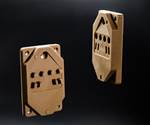CAMX Additive Manufacturing Workshop Speaker: Orbital Composites
The Additive Manufacturing Workshop for Composites at CAMX will take place on September 25 and will explore the evolution of 3D printing technology and fiber reinforcement.
At the Additive Manufacturing Workshop at this year’s CAMX, Cole Nielsen, CEO and CTO of Orbital Composites will present on the company’s “3D Printing Platform for Scalable Industry 4.0 Composites Manufacturing.”
At CAMX, Orbital Composites is unveiling a new product it calls Orb-S to address the needs of Industry 4.0 factories. Orbital’s manufacturing platform is designed to aid manufacturers in their transition into the Industry 4.0 and additive manufacturing revolutions. The tight integration of powerful software, modular hardware and a simplified user interface create the product.
Composites factories lack visibility, connectivity, and have rigid control hardware. Robots are increasingly called upon to perform complex tasks. But robots have a large programmability challenge and they require too much human intervention. 3D printing has made some strides in composites printing but has struggled to gain traction beyond prototyping. This is due to too many constraints; printer size, over-priced feedstock, material certification, uneconomical scaling, and lack of interoperability with existing automated processes.
Orbital Composites’ platform includes a highly adaptable library of modular hardware. For example: various types of 3D printing end-effectors are supported, including unreinforced thermoplastic, but also chopped and continuous fiber-reinforced thermoplastic and thermoset composites. In addition, other types of non-printing end-effectors can be integrated into the platform for processing steps and pre/post automation.
In addition to this library of hardware, the Orb-OS enterprise software platform is introduced for process automation and factory management. The software platform supports industrial internet of things (IIoT) end-effectors and cloud robotics. Each piece of modular hardware is network connected and controlled, operating in a real-time synchronous fashion through a unified control center user interface (UI). The software can be run remotely through the browser over a local on-site network, or through a secure cloud.
Orb-OS core features include real-time intelligent monitoring, diagnostics and management, allowing the creation of a digital twin during manufacture of composite parts. The inherent big-data capabilities of the platform allow advanced features such as fault analytics, machine learning and AI-enabled automation. While the Orb-S platform is applicable to composites, it is equally applicable to other manufacturing and automation processes that typically co-exist in an automotive, aerospace or energy-related composites factories.
Orbital Composites’ session on the topic will take place on Wednesday, September 25 from 2:30 p.m – 3:00 p.m.
The workshop’s agenda and registration event details are available at www.additiveconference.com/composites.
Related Content
-
Aircraft Ducts 3D Printed in Composite Instead of Metal: The Cool Parts Show #68
Eaton’s new reinforced PEKK, tailored to aircraft applications, provides a cheaper and faster way to make ducts compared to formed aluminum.
-
Airless Basketball Shows Promise of 3D Printed Lattices: The Cool Parts Show Bonus
Successfully matching the performance of a standard basketball demonstrates the control possible over the mechanical properties of digital materials.
-
Additive Manufacturing Versus Cavitation
The design freedom possible with laser powder bed fusion (LPBF) metal 3D printing is making it faster and easier to produce complex anticavitation devices for valves.














